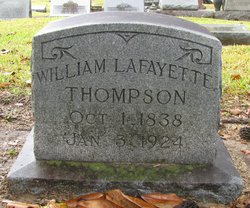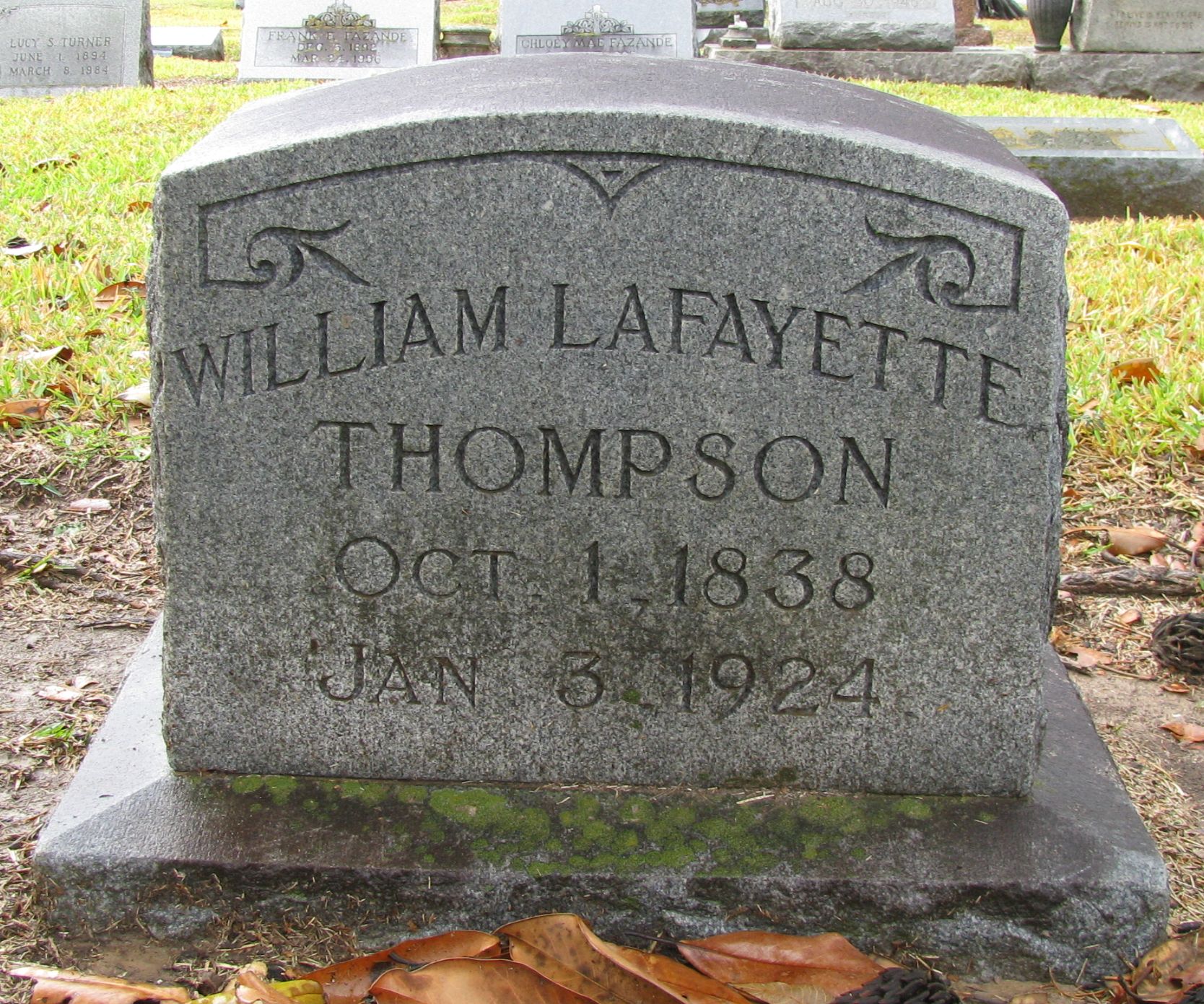attorney
Father: Alexander Thompson
Mother: Dorthy Wormack, b. Greensburg, LA
informant: Mrs. B.P. Wheat
~
THOMPSON, WILLIAM L.
William L. Thompson, of Beaumont, is one of the veteran lawyers, soldiers and political leaders of the South. His active career of half a century has interesting associations with the varied life and affairs of that time in Louisiana and Texas.
He was born in Greensburg, St. Helena parish, Louisiana, October 1, 1838. Alexander, his father, was born in Madison County, Georgia, in 1800, settled in St. Helena parish in 1818, was a planter, and died May 21, 1850. Dorothy Pryor Womack (which was the maiden name of the mother), was born in St. Helena parish, daughter of Abraham Womack, and died in 1848.
His early schooling was in the Floridian Academy in St. Helena parish, and he was graduated from the Florence Wesleyan University of Alabama in 1859, with the degree of A. B. He returned home in time to participate in the presidential campaign which was being contested by the rival factions of the Democratic party in 1860, Breckenridge and Lane, Douglas and Johnson, and Bell and Everett being the Democratic leaders of that year. He was made an elector on the Breckenridge ticket, took an active part in the campaign and advocated secession. He then entered the law school of the University of Louisiana, and his diploma of graduation states that it was issued in the first year of Con federate independence.
At the beginning of the war he enlisted in Company G, Fourth Louisiana Infantry, and during his year of service participated in the battle of Shiloh. The Fourth Regiment was then reorganized, and he was transferred to Company B, Pointe Coupee Artillery, under Captain William A. Davidson. At the battle of Baker's Creek, when Pemberton's army retired into Vicksburg to remain there during the siege and until the surrender, Mr. Thompson happened to be with a portion of the troops under Major General Loring who refused to follow Pemberton into Vicksburg, but instead fell back to Jackson, where General Joe Johnston took command of this division of the army. He remained at Jackson until the fall of Vicksburg and was in the several days fighting around Jackson before Johnston retreated. Mr. Thompson was with the army when Hood took command and began the backward movement into Tennessee, but about this time was sent on detached service into eastern Louisiana, where he commanded an independent scout detail until the final surrender.
At the close of the war he began the practice of law in Greensburg, and almost immediately became prominent in the politics of the reconstruction period. He spoke against the reconstruction acts, and in 1868 was elected a state senator, serving four years. During that time he was a member of the state central Democratic committee and a member of the sub-committee which counseled resistance to the Kellogg and favored the installation of the "de jure" governor, John McEnery. This brought on the battle of September 14th, famous in the history of Louisiana politics, when Kellogg and his police were driven into the United States customs house, at which the federal government interfered and by a display of federal bayonets overturned the "de facto" and "de jure" government which the good citizenship of the state had set up.
After practicing in Greensburg about ten years Mr. Thompson located in Seguin, Texas, in 1874, and a year later moved to San Antonio. For one year he was a partner of Judge James A. Ware, until the removal of the latter to Eagle Pass. During his residence in San Antonio, he was elected to the eighteenth and nineteenth legislatures, while Ireland was governor, and during Cleveland's administration was appointed special inspector of customs, serving four years, first at Brownsville and then at El Paso. On being relieved of this office he located in Dallas and formed a law partnership with J. D. Crutcher, but on account of ill health soon returned to San Antonio. While in Dallas he was adjutant four years of Sterling Price Camp, U. C. V., and was adjutant general of the Trans-Mississippi Department, U. C. V., under Lieut.-Gen. W. L. Cabell. He is still a member of General Cabell's staff, with the rank of colonel.
In 1900 Mr. Thompson came to Beaumont and formed a partnership with Judge D. P. Wheat. Since the election of the latter to county judge, he has practiced alone, his principal business being as representative of oil companies and in land litigation.
By resolution of the grand lodge of Louisiana Mr. Thompson is a life member of St. Helena Lodge No. 96, A. F. & A. M., at Greensburg, and is also a member of St. Helena Chapter No. 26, R. A. M. Since living in Texas he has affiliated with Anchor Lodge at San Antonio. He is a member of the Methodist church and was superintendent of the Sunday school while a resident of San Antonio.
While living at Greensburg soon after the war he married Miss Neanie Andrews of that town. She died in 1883 at San Antonio, the mother of four children: John Wheat Thompson, who is chief clerk of the judge advocate general of the United States Army, Department of the Lakes, at Chicago; Willie Batie, wife of Charles J. Grant, of Dallas; Lettie E., wife of Judge D. P. Wheat, of Beaumont; and Herbert Andrews, of Beaumont. Mr. Thompson through these children has twelve grandchildren.
His present wife, whom he married in Houston, was Miss Cassie Burkhart. They have two children: William L., Jr., aged nine; and Carrie May, aged six.
Historical Review of South-East Texas and the Founders, Leaders and Representative Men, Vol 2, by Dermot Hardy and Maj. Ingham S. Robert, by The Lewis Publishing Company, Chicago, 1910
attorney
Father: Alexander Thompson
Mother: Dorthy Wormack, b. Greensburg, LA
informant: Mrs. B.P. Wheat
~
THOMPSON, WILLIAM L.
William L. Thompson, of Beaumont, is one of the veteran lawyers, soldiers and political leaders of the South. His active career of half a century has interesting associations with the varied life and affairs of that time in Louisiana and Texas.
He was born in Greensburg, St. Helena parish, Louisiana, October 1, 1838. Alexander, his father, was born in Madison County, Georgia, in 1800, settled in St. Helena parish in 1818, was a planter, and died May 21, 1850. Dorothy Pryor Womack (which was the maiden name of the mother), was born in St. Helena parish, daughter of Abraham Womack, and died in 1848.
His early schooling was in the Floridian Academy in St. Helena parish, and he was graduated from the Florence Wesleyan University of Alabama in 1859, with the degree of A. B. He returned home in time to participate in the presidential campaign which was being contested by the rival factions of the Democratic party in 1860, Breckenridge and Lane, Douglas and Johnson, and Bell and Everett being the Democratic leaders of that year. He was made an elector on the Breckenridge ticket, took an active part in the campaign and advocated secession. He then entered the law school of the University of Louisiana, and his diploma of graduation states that it was issued in the first year of Con federate independence.
At the beginning of the war he enlisted in Company G, Fourth Louisiana Infantry, and during his year of service participated in the battle of Shiloh. The Fourth Regiment was then reorganized, and he was transferred to Company B, Pointe Coupee Artillery, under Captain William A. Davidson. At the battle of Baker's Creek, when Pemberton's army retired into Vicksburg to remain there during the siege and until the surrender, Mr. Thompson happened to be with a portion of the troops under Major General Loring who refused to follow Pemberton into Vicksburg, but instead fell back to Jackson, where General Joe Johnston took command of this division of the army. He remained at Jackson until the fall of Vicksburg and was in the several days fighting around Jackson before Johnston retreated. Mr. Thompson was with the army when Hood took command and began the backward movement into Tennessee, but about this time was sent on detached service into eastern Louisiana, where he commanded an independent scout detail until the final surrender.
At the close of the war he began the practice of law in Greensburg, and almost immediately became prominent in the politics of the reconstruction period. He spoke against the reconstruction acts, and in 1868 was elected a state senator, serving four years. During that time he was a member of the state central Democratic committee and a member of the sub-committee which counseled resistance to the Kellogg and favored the installation of the "de jure" governor, John McEnery. This brought on the battle of September 14th, famous in the history of Louisiana politics, when Kellogg and his police were driven into the United States customs house, at which the federal government interfered and by a display of federal bayonets overturned the "de facto" and "de jure" government which the good citizenship of the state had set up.
After practicing in Greensburg about ten years Mr. Thompson located in Seguin, Texas, in 1874, and a year later moved to San Antonio. For one year he was a partner of Judge James A. Ware, until the removal of the latter to Eagle Pass. During his residence in San Antonio, he was elected to the eighteenth and nineteenth legislatures, while Ireland was governor, and during Cleveland's administration was appointed special inspector of customs, serving four years, first at Brownsville and then at El Paso. On being relieved of this office he located in Dallas and formed a law partnership with J. D. Crutcher, but on account of ill health soon returned to San Antonio. While in Dallas he was adjutant four years of Sterling Price Camp, U. C. V., and was adjutant general of the Trans-Mississippi Department, U. C. V., under Lieut.-Gen. W. L. Cabell. He is still a member of General Cabell's staff, with the rank of colonel.
In 1900 Mr. Thompson came to Beaumont and formed a partnership with Judge D. P. Wheat. Since the election of the latter to county judge, he has practiced alone, his principal business being as representative of oil companies and in land litigation.
By resolution of the grand lodge of Louisiana Mr. Thompson is a life member of St. Helena Lodge No. 96, A. F. & A. M., at Greensburg, and is also a member of St. Helena Chapter No. 26, R. A. M. Since living in Texas he has affiliated with Anchor Lodge at San Antonio. He is a member of the Methodist church and was superintendent of the Sunday school while a resident of San Antonio.
While living at Greensburg soon after the war he married Miss Neanie Andrews of that town. She died in 1883 at San Antonio, the mother of four children: John Wheat Thompson, who is chief clerk of the judge advocate general of the United States Army, Department of the Lakes, at Chicago; Willie Batie, wife of Charles J. Grant, of Dallas; Lettie E., wife of Judge D. P. Wheat, of Beaumont; and Herbert Andrews, of Beaumont. Mr. Thompson through these children has twelve grandchildren.
His present wife, whom he married in Houston, was Miss Cassie Burkhart. They have two children: William L., Jr., aged nine; and Carrie May, aged six.
Historical Review of South-East Texas and the Founders, Leaders and Representative Men, Vol 2, by Dermot Hardy and Maj. Ingham S. Robert, by The Lewis Publishing Company, Chicago, 1910
Family Members
Sponsored by Ancestry
Advertisement
Explore more
Sponsored by Ancestry
Advertisement








